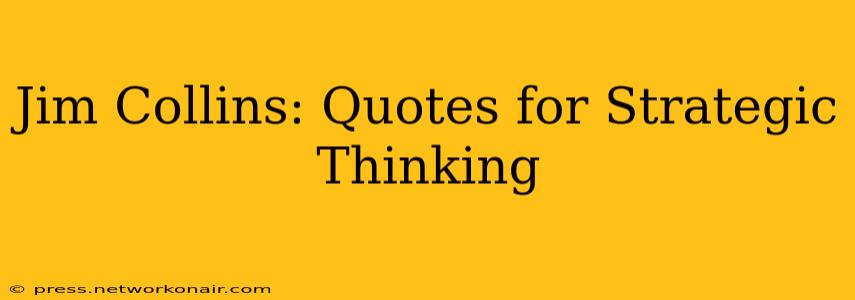Jim Collins, a renowned author and researcher known for his impactful business books like Good to Great and Built to Last, offers a wealth of wisdom for strategic thinking. His insights, often conveyed through concise and memorable quotes, provide a roadmap for leaders navigating the complexities of building enduring and successful organizations. This article delves into some of his most insightful quotes, exploring their meanings and practical applications in strategic planning and execution.
What are Jim Collins' key ideas on strategic thinking?
Collins' core ideas revolve around disciplined thought, rigorous self-examination, and a deep understanding of one's strengths and weaknesses. He doesn't offer quick fixes but rather emphasizes a systematic approach to building greatness, stressing the importance of long-term vision and a commitment to excellence. His work emphasizes finding and nurturing a strong core ideology, coupled with an ability to adapt and change in response to market forces. He advocates for building a culture of sustained excellence driven by a clear understanding of the organization's purpose and values.
How can Jim Collins' quotes help in strategic planning?
Collins' quotes serve as powerful guiding principles for strategic planning. By understanding the underlying concepts, leaders can make more informed decisions, fostering a culture of innovation and strategic focus. His emphasis on self-awareness, rigorous analysis, and understanding one's "circle of competence" allows organizations to allocate resources efficiently and avoid strategic pitfalls.
"Great vision without great people is irrelevant." - What does this mean?
This quote highlights the critical role of people in achieving a vision. A brilliant strategy is only as good as the team executing it. Collins emphasizes the need to recruit, develop, and retain highly capable individuals who are not only skilled but also share the organization's values and commitment to excellence. Strategic planning must consider talent acquisition, development, and retention as crucial components. Without the right people, even the most meticulously crafted strategy will likely fail.
"The key is not primarily to have ambitious goals, but to build an organization capable of achieving ambitious goals." - What does this mean in a practical sense?
This quote shifts the focus from simply setting ambitious targets to building the organizational capacity to reach those targets. It's not enough to dream big; you need to ensure your organization has the right structure, processes, talent, and culture to support the ambitious pursuit. This includes developing robust systems, processes, and leadership capabilities that can handle growth and challenges. Practical implications involve investing in infrastructure, training, and developing a culture of continuous improvement.
"Good is the enemy of great." - How does this relate to strategic thinking?
This powerful quote underscores the dangers of complacency. Being "good" can often prevent an organization from striving for "greatness." It encourages a constant pursuit of excellence, pushing boundaries, and challenging the status quo. In strategic thinking, this means continuously evaluating performance, identifying areas for improvement, and relentlessly pursuing innovation. It's about a mindset of never being satisfied with the current level of achievement.
What are some other key quotes from Jim Collins related to strategic thinking?
While the previously discussed quotes are cornerstone concepts, other impactful quotes from Collins' body of work add further nuance to strategic thinking. These quotes often emphasize a deeper understanding of the organization's purpose, its strengths, and its commitment to long-term vision.
Conclusion: Applying Jim Collins' wisdom to your strategic planning.
Jim Collins' insights offer a powerful framework for strategic thinking. By understanding and applying these principles – focusing on people, building organizational capacity, striving for greatness, and having a clear vision – organizations can significantly improve their chances of achieving long-term success. His work encourages a disciplined and rigorous approach, emphasizing the importance of self-awareness, continuous improvement, and a relentless pursuit of excellence. Remember, building a great organization is a journey, not a destination, and Collins' words serve as a valuable compass along the way.

